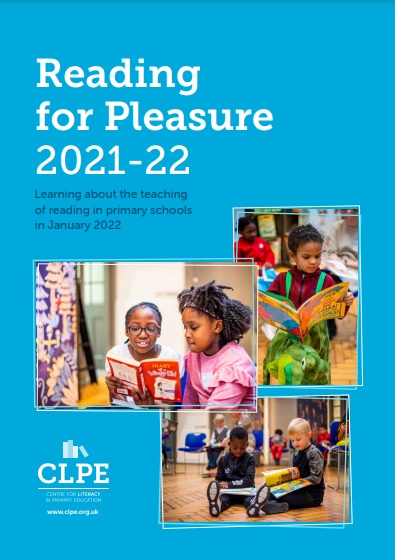School budgets put the squeeze on reading for pleasure
Posted on Tuesday, March 1, 2022
Category: News

New research from the Centre for Literacy in Primary Education (CLPE) highlights the urgent need to prioritise reading for pleasure and give children access to a wider range of books, following the universal disruption to education by the Covid-19 pandemic.
The CLPE report states: "Last year (in 2021) teachers told us that they were worried about children's access to books. Schools were working incredibly hard to get books to children in their homes. We were interested to find out what the access to books and what the level of book stock was like one year on."
The CLPE Reading for Pleasure 2022 report highlights the urgent challenges schools are facing in helping children discover a love for reading, with 25% of schools have fewer books now than before the pandemic, while more than 60 per cent of classrooms have no access to a budget for new books.
Who is buying books for classrooms?
Just 37% of teachers have a budget from their school for new books, so it is falling to teachers to plug the gap themselves, with almost two in five (38%) of teachers in England providing new books for their pupils out of their own pocket, as historically small school budgets continue to be constrained post-pandemic. 17% of teachers rely on donations in order to update their book stock, while 8 per cent say they never get new books at all in their classrooms.
Nearly half the teachers (48%) questioned said they are unable to change the books in their classroom during the school year, meaning the opportunity for children to discover new books and explore their tastes and interests is severely limited.
Few new books in class
While the majority of primary school teachers questioned (95 per cent) said they have a book corner in their classrooms, over half of these (57%) contain fewer than 100 books. To encourage reading for pleasure, schools need to be able to provide children with a range of books, says the report. "Books are the foundation of any reading curriculum and the most important aspect of any reading classroom."
Significantly, 84% of classrooms in early years and 73% of classrooms in Y1 have fewer than 100 books in their book corner; children in these year groups are much more likely to be in classrooms where there are fewer books.
Where schools and classrooms have limited book stock, this is particularly damaging for children whose circumstances mean that they do not have access to books at home and whose reading progress is likely to have been affected adversely by lockdowns. Schools need a wide selection of books to support children to discover and develop a love of reading.
Reading for pleasure
Reading aloud is probably the most important thing that teachers can do and needs to be a frequent and regular part of each school day. Reading aloud "slows written language down and enables children to hear and take in tunes and patterns. It enables children to experience and enjoy stories that they might not otherwise meet," says the report.
Teachers are reading aloud with more frequency than during the 2020 survey, with the biggest uplift in EYFS and Y1/2. The pattern was similar across the year groups, although teachers were more likely to read more frequently with the youngest children.
Effect of the pandemic on reading
The research results comes at a time when The Department for Education's own data shows that over a quarter of 11-year-olds were not reaching the expected standard in reading before the pandemic, and The Centre for Education and Youth's research – alongside that of other organisations – shows that the pandemic has likely made this worse.
On the return to schooling for all pupils, teachers continue to work hard to build on the successes of some children during periods of interrupted schooling and to overcome the challenges faced by many others in deciding how best to evaluate and deliver a reading curriculum which allows all children to make progress.
Teachers noted that some children, notably those who had good access to texts at home, technology to access home learning and engaged adults to support them, had actually made more progress during periods of interruption. However, for many more, they noted the adverse effects of the interruption to children's access to, learning and progress in reading, particularly for disadvantaged children who did not have these same advantages and experiences.
Areas of concern
Teachers pointed to a number of areas of concern that they wanted to focus on as children returned to full time schooling. These included the availability of resources in school to target areas of focus for the children, particularly understanding of language and vocabulary, reading fluency, inference and deduction and the exposure to a range and breadth of texts. Teachers were also concerned about the availability of texts for both taught and independent reading, which would support them in targeting these areas of concern.
A return to Individual Reading was mentioned as a key priority that they were returning to more than before the pandemic for many teachers who were aware that there were so many children who hasn't been read with, or had read independently throughout periods of interrupted schooling.
